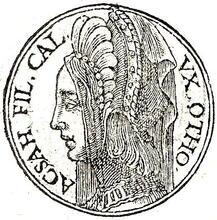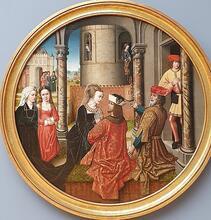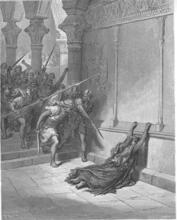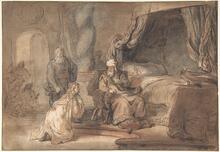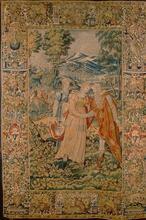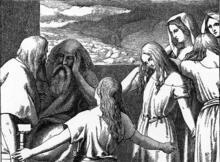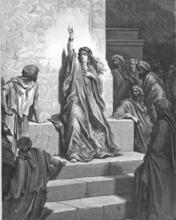Maacah the wife of David: Midrash and Aggadah
Maacah is an eshet yefat to’ar, a non-Jewish woman captured during wartime for the purpose of becoming a wife to her Israelite captor. Deuteronomy lists specific conditions the woman must follow to wed an Israelite, such as shaving her head, that are intended to discourage the union by making the woman seem undesirable. This does not stop King David from taking Maacah for a wife, and she bears him a son, Absalom, who grows up to turn on his father and even attempts to kill him. The Rabbis criticize David for his actions and the way his son acted and believe the fate of Absalom was caused by David taking an eshet yefat to’ar for a wife.
Article
Maacah, the daughter of King Talmi of Geshur, was married to King David and bore him his son Absalom. In the A type of non-halakhic literary activitiy of the Rabbis for interpreting non-legal material according to special principles of interpretation (hermeneutical rules).Midrashic account, David saw Maacah when he went forth to war; he desired her and he took her as an eshet yefat to’ar (Tanhuma [ed. Buber], Ki Teze 1)—a non-Jewish woman taken captive during wartime and who is desired by her Israelite captor, who wants to marry her. He may do so under the conditions that are specified in Deut. 21:10–14. The woman must first shave her hair and pare her nails, then wear mourning clothing and lament for her parents’ home for a month. Only after all these steps is her captor permitted to take her as his wife. The Rabbis did not look favorably on the man who took an eshet yefat to’ar for himself; they say that the disfigurement of the shaving of her hair was meant to make her repulsive to her captor (BT Yevamot 48a).
The Rabbis severely criticize David for taking to himself an eshet yefat to’ar. Deut. 21 speaks of three topics in succession: the eshet yefat to’ar (21:10–14); the instance of a man who has two wives, one loved and the other unloved (vv. 15–17); and the “wayward and defiant son” (vv. 18–21; for the meaning of this term, see below). The Rabbis derive from this juxtaposition that one transgression leads to another. If a person brings an eshet yefat to’ar into his home, he introduces dissension. The eshet yefat to’ar with shaven head is not desirable to him, and so he becomes the husband of two wives, only one of whom he loves. This complicated family situation with two wives, one of whom he hates, leads to his child being a “wayward and defiant son.” The Rabbis exemplify such a process with the marriage of David and Maacah. Maacah, an eshet yefat to’ar, bore Absalom, who acted as a “wayward and defiant son.” Deut. 21:18–21 defines such a child as one who does not heed his parents, throws off all restraints and lives a riotous life, gorging himself on meat and drinking large quantities of wine. The Rabbis provide detailed (The legal corpus of Jewish laws and observances as prescribed in the Torah and interpreted by rabbinic authorities, beginning with those of the Mishnah and Talmud.halakhic) definitions of the transgressions ascribed to such a son (M Sanhedrin 8; BT Sanhedrin 71a), and they portray Absalom as acting like such a son, as is attested by his extreme actions: he sought to kill his father David; he slept with his father’s wives, “in the sight of all Israel and in broad daylight” (II Sam. 12:12); because of him, several myriads of Israelites fell in his war against David; he also caused dissension in Israel, between his followers and David’s loyalists. Absalom was responsible for the deaths of Shimei son of Gera, Sheba son of Bichri, Ahitophel, Mephibosheth and Ish-bosheth. According to the Rabbis, Absalom’s shameful behavior was a consequence of David’s marriage to Maacah and punishment for David’s lusting after an eshet yefat to’ar (Tanhuma, Ki Teze 1).

